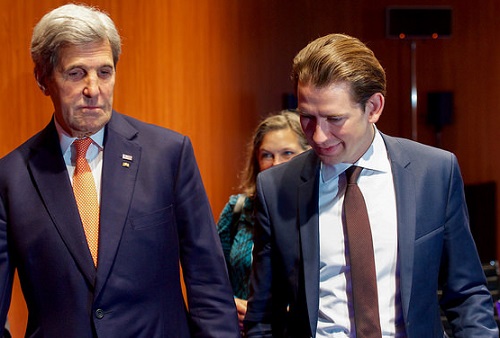
Sebastian Kurz made history when Austrian voters elected him the world’s youngest leader on October 15 at the age of 31. His ascent has been met with jubilation or trepidation across the transatlantic space. Some European media say paint him as dangerously far-Right. For instance, the satirical Titanic magazine in neighboring Germany, has repeatedly called Kurz “Baby Hitler” and depicted his assassination. On the other hand, the Catholic Herald of London dubbed Kurz “Europe’s Christian Chancellor.”
Where does the young man, whom his followers joke can “walk on water,” really mean for his country? Will Kurz join the continent’s populist bloc, support faith and free markets, or chart another course altogether?
Understanding the issue takes on new urgency, as sources close to Kurz leaked the news yesterday that his Austrian People’s Party (Österreichische Volkspartei, or ÖVP) is competing negotiations for a coalition government with Heinz-Christian Strache’s Freedom Party (Freiheitliche Partei Österreichs, or FPÖ). They plan to be sworn into office on December 20.
Kurz has highlighted the unique role that faith and reason played in forming Western culture. “What has shaped Europe, what has shaped Austria?” he asked. “We have a culture shaped by our Judeo-Christian heritage and the Enlightenment – and this culture needs protecting, especially at a time of high and rising immigration.”
Unlike many European leaders, Kurz has highlighted his personal adherence to the Roman Catholic faith. “Faith plays an important role for me,” he said, adding that he finds attending Mass on holidays “very important.” Sources close to him said he will “fight” for “his own Christian values.” (Some in Europe have asked how much his faith – which Kurz has described as “very private” – aligns with his longtime cohabitation.)
Kurz campaigned on significant free market reforms. His party platform promised to cut taxes to spur economic “motivation,” to “reduce the record debt-to-GDP ratio of 85 percent of GDP,” and to trim “excessive bureaucracy.” However, it favors (continuing) state intervention in other areas of the economy.
That mixture reflects the fact that his party emerged from the unique milieu of post-Vatican II, European Christian Democracy, explains Mark R. Royce in a new essay for Religion & Liberty Transatlantic:
The reformed Catholicism of the Second Vatican Council found its lay counterpart in the postwar formation of European political parties that sought to reconcile their Christian faith with a renewed commitment to democratic politics. Although the ÖVP platform supports Christian teaching in the schools and opposes abortion and euthanasia, it also consistently urges environmental protection – including animal rights – solidarity among workers, equality between the sexes, and accessible housing and transportation. The party also lowered the voting age to 16, widening democratic participation. Finally, the Folk manifesto pledges a robust commitment to continued participation in the European Union (EU) despite its self-evident disorder, stating, “We affirm – like the Christian Democratic founding fathers of European integration – that the unification of Europe affords the best protection against nationalism and chauvinism.”
The ÖVP’s environmentalism and Europhilia were on display last Friday, when Kurz’s coalition announced plans to lobby the post-Brexit EU for a new pact to make nations that oppose nuclear energy “better off financially.”
Royce pays keen attention to Kurz’s views of religious expression and pluralism, as manifest in his treatment of Islamic migrants. Having been published in Providence, and written a book analyzing how religion affected support for or opposition to the European Union (You can read Religion & Liberty Transatlantic’s book review here), Royce brings acute focus to the intersection of faith – all faiths – and the public square.
On the campaign trail this year, Kurz co-opted FPÖ’s hard-line stance on immigration by burnishing his record in shutting down the “Balkan route” via Greece as foreign minister. He spoke against allowing Islamic fundamentalists to create a “parallel” society within Europe. However, Royce sees a genuinely, and generously, pluralistic leader at work:
[Emphasizing] a Europeanization of Islam, Kurz in 2015 moved passage of Austria’s astonishing Islam Law (Islamgesetz), which accords institutional prerogatives to the religion unlike any other nation-state in Europe. Provided that imams do not preach against the Austrian state and society, or foment sedition, their religion is recognized under public law. It was given a seminary in Vienna, along with state protection for Friday prayers and several Islamic holidays. The government even made it unlawful to protest or demonstrate outside a mosque while it is being used for worship (§13.3), lest members of the congregation feel intimidated.
Kurz’s coalition with the FPÖ, once led by the late Jörg Haider, will cause some to continue viewing the nascent government with caution. However, Royce sees Kurz’s history of tolerance and support for market reforms as reasons for hope that better things may be in store.
(Photo credit: U.S. State Dept. Public domain.)